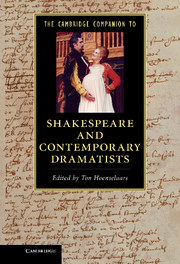Book contents
- Frontmatter
- Contents
- Illustrations
- Contributors
- Preface
- Chronology of the life and work of Shakespeare and contemporary dramatists
- 1 John Lyly and the University Wits
- 2 Thomas Kyd and the Elizabethan blockbuster
- 3 ‘The words of Mercury’
- 4 The dyer’s hand
- 5 Urbane John Marston
- 6 Thomas Dekker and the emergence of city comedy
- 7 Shakespeare
- 8 Thomas Heywood
- 9 George Chapman’s learned drama
- 10 Francis Beaumont and John Fletcher’s tragicomedy as musical melodrama
- 11 Thomas Middleton and the early modern theatre
- 12 John Webster
- 13 John Ford
- 14 Philip Massinger
- 15 Richard Brome and the idea of a Caroline theatre
- 16 Troublesome histories
- Select bibliography
- Index
- References
2 - Thomas Kyd and the Elizabethan blockbuster
The Spanish Tragedy
Published online by Cambridge University Press: 05 December 2012
- Frontmatter
- Contents
- Illustrations
- Contributors
- Preface
- Chronology of the life and work of Shakespeare and contemporary dramatists
- 1 John Lyly and the University Wits
- 2 Thomas Kyd and the Elizabethan blockbuster
- 3 ‘The words of Mercury’
- 4 The dyer’s hand
- 5 Urbane John Marston
- 6 Thomas Dekker and the emergence of city comedy
- 7 Shakespeare
- 8 Thomas Heywood
- 9 George Chapman’s learned drama
- 10 Francis Beaumont and John Fletcher’s tragicomedy as musical melodrama
- 11 Thomas Middleton and the early modern theatre
- 12 John Webster
- 13 John Ford
- 14 Philip Massinger
- 15 Richard Brome and the idea of a Caroline theatre
- 16 Troublesome histories
- Select bibliography
- Index
- References
Summary
Six years older than Shakespeare and Marlowe, Thomas Kyd (1558–94) shares with them the honour of being among the first writers of tragedy in English. Together, Kyd, Marlowe and Shakespeare turned the decasyllabic blank verse into the form of expression that gave English Renaissance drama its unique character. It is impossible to say if Kyd’s The Spanish Tragedy precedes or postdates Marlowe’s Tamburlaine, but the more than generous attention it was soon to receive in revivals, editions, quotations, allusions and parodies, suggests that it was the first early modern blockbuster.
Kyd’s early life had much in common with Shakespeare’s. Both playwrights were born into a middle-class background, and their fathers enjoyed a good social status. Kyd’s father, a scrivener or court notary, served as Warden of the Company of Scriveners in 1580 and Shakespeare’s held municipal offices as alderman and bailiff. They differ, though, in one respect: whereas Kyd’s father was highly literate, Shakespeare’s signed legal documents with an illiterate man’s mark. Marlowe, George Peele, Robert Greene, Thomas Nashe and Thomas Lodge all had an academic background, but there is no indication that Kyd or Shakespeare attended university, even though they received a good secondary education. At the King’s New School in Stratford, Shakespeare was taught by two learned schoolmasters: Simon Hunt – who left Stratford in 1575 for the Catholic seminary at Douai and became a Jesuit – and Thomas Jenkins. Kyd attended one of the most advanced educational centres in London, Richard Mulcaster’s Merchant Taylors’ School, which also had Edmund Spenser and Thomas Lodge among its pupils. Both Kyd and Shakespeare may have done some play-acting at school, because performing Latin plays was part of the curriculum. Before becoming playwrights for some of the most successful companies of their time, they may also have worked as players, and both, without permanent success, looked for the patronage of a noble lord. Both have been suspected of Catholic sympathies without conclusive evidence.
- Type
- Chapter
- Information
- Publisher: Cambridge University PressPrint publication year: 2012
References
- 1
- Cited by

